- Home
- Richard Lee Byers
The Masked Witches Page 6
The Masked Witches Read online
Page 6
“What happened?” Cera asked. She dropped to her knees beside the griffon that, even crumpled in the snow, made her look as small as a child by comparison.
“The shadow wolves,” Aoth said.
“Will he be all right?” Vandar asked.
“You’d better hope he will be,” said Aoth. “Why in the name of the Black Hand did you attack before I gave the signal?”
“I don’t take orders from you!” Vandar snapped, before taking a breath. “But understand, the fury is a gift of the spirits, and sometimes it takes us when they will it. I think maybe the oak telthor raised it in me because he couldn’t have lasted much longer.”
Aoth realized he’d forgotten all about the ghostly giant. He glanced in the direction of the blighted tree and discovered the apparition had disappeared. “I don’t care about your stinking spirit,” he said.
“Enough!” Cera said. “Both of you, be quiet and let me work.”
She whispered a prayer, and her hands glowed as she laid them on Jet’s flank. She moved them to his neck—specifically, to another spot where a shadow beast had bitten the griffon, Aoth surmised, although he didn’t know how she could tell—and did the same thing there. Then she infused the tip of a wing with Amaunator’s healing light.
Gradually, the magic did its work. Aoth could feel the change in Jet as the oblivion of near-death gave way to ordinary sleep.
Aoth took a deep breath, then let it out again. “You did it,” he said. “He’s going to be all right.”
“I know,” Cera replied, stroking Jet’s head. Grunting, she tried to stand. Aoth helped her. She looked at Vandar and said, “I have a little power left. Enough to tend you, too.”
“Do that,” said Aoth. “Then the two of you stay with Jet. Jhesrhi and I are going to go and check on something.”
As he led her into the trees, the wizard said, “I’m glad Jet’s going to live.”
“He’s too cantankerous to die,” Aoth replied. “Do you ever wonder why no matter where we go anymore, we end up fighting the undead?”
The bare hint of a smile tugged at the corners of Jhesrhi’s mouth for a moment, then vanished. “I take it we’re going to see if they crawled out of the tomb you and Cera found,” she said. “Or if we can figure out where else they came from.”
“Yes,” Aoth replied. “Once again, some footprints would be helpful.”
Jhesrhi shrugged. “Undead, even the ones that still have a physical form, tend to be good at sneaking around,” she said. “Werewolves, too, I imagine. They may not even have needed a spell to avoid making tracks.”
“That still doesn’t explain why, if they came from outside the grove, Jet and I didn’t see them when we were flying around above the treetops.” Aoth said.
They reached the spot where the hole led into the tomb. Aoth crawled in, the gnarled roots catching on his clothing and in the links of his mail. Jhesrhi followed and set the head of her brass staff burning like a torch. They stalked on down the stairs, only to find the same vacant, echoing passages he and Cera had explored before.
And as before, he and his companion ended up in the hub by the sarcophagus when their search was done. He resisted a childish impulse to kick it.
* * * * *
Uramar studied the stocky, tattooed war mage with the luminous blue eyes and the tall, golden-haired elementalist with the fiery staff. It wasn’t difficult. As people commonly reckoned distance, they were only a couple of paces away. In another, equally valid sense, they and their frustration occupied a completely different world.
From their remarks to one another, Uramar gathered that the frustration stemmed partly from the fact that the tattooed man was accustomed to seeing whatever existed to be seen. But at the moment, it was his misfortune to be looking for something invisible to any form of vision, even truesight.
Uramar’s invisibility gave him an advantage. He could spring forth and strike by surprise. As his hands clenched on the hilt of his greatsword, an assortment of his broken souls whispered to him.
“Kill them …”
“It will be easy …”
“Kill them, reanimate them, and then they can serve our cause …”
But as was often the case, other voices disagreed.
“No. You saw how formidable they are …”
“If there was only one, yes, but there are two …”
“Don’t risk giving away our secrets. A better opportunity will surely come along …”
For a moment, the clamor set pain throbbing in Uramar’s temples, and he staggered a step and groaned. Then the contradiction resolved itself, and he knew that he should indeed wait.
Such being the case, there was no point in letting proximity to the mortals tantalize the more bloodthirsty parts of his nature any further. He turned and crept away. Instinct made him silent even though he knew that really, the folk behind him wouldn’t notice even if he shouted at the top of his mismatched lungs.
T
H
R
E
E
Jhesrhi had noticed that few structures in Immilmar looked particularly new. Apparently Rashemi saw little reason to put up a new building until an old one had rotted out and fallen down. But even by local standards, the whitewashed longhouse called the Witches’ Hall had an air of antiquity about it. It was easy to believe that the dragons, unicorns, and hounds carved under the eaves had glared their forbiddance at the first Iron Lord to walk the city’s muddy, unpaved streets.
And forbiddance it would surely have been, for as the summons had made clear, even when the Wychlaran saw fit to call nonhathrans to their sanctuary, that didn’t mean they were invited into the sacred precincts of the hall. As Jhesrhi, Aoth, and Cera approached, a masked woman stepped forward from her post before the front entrance and gestured for the newcomers to follow her.
She led them around to the south side of the longhouse, where someone had either dug out a small amphitheater or had taken advantage of a natural depression in the ground to fashion one. Somebody had removed some of the snow, too, but Jhesrhi suspected the plank benches would still make cold, damp seating for those who, unlike her, didn’t have fire flowing in their veins.
“By the Pure Flame,” Aoth muttered.
When Jhesrhi glanced around, she saw what had annoyed him. She knew he’d hoped the summons was for him and his comrades alone, or at worst for them, Vandar, and other representatives of the Griffon Lodge. Plainly that wasn’t the case, for Dai Shan, the leader of the Shou, and Mario Bez were approaching, each accompanied by several of his men. The skyship captain shot Aoth a grin as he made a point of claiming a seat right beside him.
“The heroes of the day,” Bez said. “Congratulations.”
“We were ready for them,” Aoth replied with a shrug.
“Still, even for dragon slayers, it can’t have been easy to contend with undead spellcasters and superior numbers,” the captain said. “You should have told me what you intended. I could have spared a few men to stay and lie in wait with you.”
“And win the Storm of Vengeance a share of the credit if the killers actually did show up?” Cera asked.
Bez spread his hands in mock dismay. “Sunlady, you wound me,” he said. “Naturally, my concern would have been your safety, and Lady Jhesrhi’s.”
Jhesrhi decided there was no reason to pay further attention to what Bez had to say. He was more than likely sniffing for information—which Aoth and Cera were too wary to give him—and his was the sort of oblique, bantering conversation that made her feel tongue-tied and dull. Well, except sometimes, when it was Gaedynn …
With a scowl, Jhesrhi pushed the archer’s face with its shrewd eyes and flippant smirk out of her mind. In search of distraction, she watched Mangan Uruk, Vandar, and Folcoerr Dulsaer arrive. The berserker wore his beadwork regalia, and the half-elf had a sneer for each of his rivals.
Almost as soon as everyone had found a seat, they all had to stand up again as masked witches filed
out of the longhouse.
They were not alone. Ghostly telthors flew, padded, bounded, scurried, or crawled along with them. In that first moment, Jhesrhi made out a hawk, a vulture, two bears, a squirrel, an otter, and a snake. Many of the creatures flickered, visible one instant and gone the next. None left any tracks in the snow. Their profusion reminded Jhesri that Rashemen was filled with nature spirits.
A number of the smaller familiars accompanied their mistresses to their seats on the benches. The others looked down on the assembled humans from the top of the amphitheater, or perched on the limbs of nearby trees.
One hathran had no phantom companion that Jhesrhi could see. Clad in a simple leather mask and brown hooded robe, she remained standing at the bottom of the amphitheater, and, when she was ready, slashed a bluewood wand through an intricate figure. Nothing overt happened as a result. Maybe it was simply a way of asking the gods to bless the gathering, for a hathran’s arts were a mixture of the priestly and the arcane. It was a disorderly hodgepodge to Jhesrhi’s way of thinking, but maybe she wasn’t giving the barbarians enough credit.
“Be seated,” said the witch. She had a cold contralto voice that carried well. “Many of you know me, but not all. I’m Yhelbruna. With the help of Vandar Cherlinka, I brought the griffons down from the mountains. I’m also the one who cast the runes and determined that it isn’t necessarily the will of the spirits that this living treasure remain in Rashemen, disappointing and bewildering as that seemed. Word of the beasts’ existence, the news that drew Aglarondans, Theskians, and sellswords here, went out at my behest.
“At times,” she continued, an unexpected wry note entering her voice, “I regretted that action, for you travelers began to arrive, and, to my embarrassment and the Iron Lord’s, I still had no clear idea of the spirits’ plan for the griffons. But in light of recent events, and after prayer and meditation, I do now.”
Aoth leaned forward. Cera took his hand and gave it a squeeze.
Bez called, “Who gets the animals, then? Don’t keep us in suspense.”
Although their masks, voluminous garments, and air of aloof dignity made it difficult to be certain, Jhesrhi had the feeling that some of the hathrans were taken aback that he’d had the temerity to speak without permission.
Yhelbruna, however, answered without any show of resentment. “I have no wish to keep you in suspense, Captain, and I promise I’ll give you an answer soon enough,” she said. “But there are things you need to hear first in order to understand it.”
Aoth snorted. Leaning toward Cera, and Jhesrhi on the other side of her, he whispered, “Someday a matter will be simple and straightforward again, and we’ll realize we’ve forgotten how to react.”
“For about a year,” Yhelbruna continued, “the undead have been troubling Rashemen. This, of course, is scarcely a unique occurrence. Our land is rich in magic and old as well. In ages past, it was home to folk who trafficked with dark powers. It’s the kind of place where the dead are going to wake and walk from time to time.
“Still, of late, there’s simply been too much of it. The ghosts and revenants have been too powerful, and too intent on doing harm for harm’s sake.”
Dulsaer shook his head. “Aren’t they always ‘intent on doing harm for harm’s sake?’ ” he said.
“Actually, no,” said Aoth, “not always. Although they may have vile hungers to satisfy, and an innate viciousness that prompts them to attack anyone they happen to encounter. But I get the feeling High Lady Yhelbruna is talking about more than that.”
The hathran nodded. “I am,” she said. “On our journey into the High Country, Vandar and I encountered an undead hag and some zombie goblins going to considerable trouble to break a Raumathari demon trap, for no discernible reason other than malice. There have been a number of similar incidents, including the recent outrage in the sacred grove, which was probably the most flagrant example of all.”
Dai Shan cocked his head and placed his rather delicate-looking hands together, fingertip to fingertip. “How so, wise priestess?” he asked.
“In the last century,” Yhelbruna said, “we Wychlaran had a falling out among ourselves. Some of our sisters, who came to be called the durthans, turned to commerce with wicked spirits and the fey, and formed their own secret sorority in our midst. And when we started to unmask them, they fled to strongholds in the wilderness, where they plotted to seize the control of the realm. When the opportunity presented itself—as it did when our foes the Thayans started fighting among themselves—we had no choice but to stamp them out.”
Dulsaer nodded. “I’ve heard something about this ‘Witch War of Rashemen,’ ” he said.
“Indeed,” said Yhelbruna, although with a hint of distaste in her tone, as if she found the name vulgar. “And I’m bringing it up because we’ve identified the creatures who attacked the grove.”
Apparently restless, a transparent jay with a streaked crown fluttered up from a copper-masked hathran’s shoulder. A misty adder coiled in its mistress’s lap lifted its wedge-shaped head to track the other telthor’s flight.
“I take it,” Vandar said, “that they were durthans when they were alive.”
“Yes,” Yhelbruna answered. “A formidable coven that caused a great deal of misery working from a lair in the Erech Forest. When we finally found them, killed them, and buried them, we took considerable pains to ensure that they wouldn’t rise again.”
Jhesrhi made a little spitting sound. “Incompetents,” she whispered. “They should have burned the corpses.”
Or at least she thought she had whispered. But to her surprise and embarrassment, Yhelbruna replied to her. “You’re right,” said the witch. “But some of the women had been fine hathrans before they turned down the wrong path. So we chose to lay them to rest with the rites that are due a hathran, and the fact of the matter is, no one should ever have been able to find them, let alone reanimate them.”
“Yet apparently someone did,” Cera said. “Or else they came back because of some other influence.”
“And that’s not the extent of the mystery,” Yhelbruna said. “We buried them in the Erech Forest, which is to say, in the northwest, on the other side of Lake Ashane. How, then, did they make their way to the outskirts of the Ashenwood without being detected?”
“Flying by night?” Dulsaer suggested. “Surely at least a few of you witches have mastered that particular magic.”
“Possibly,” Yhelbruna said, “although by day or night, we hathrans have watchers in the sky. Still, why come so far?”
“Because the oak spirit only lives a stone’s throw from Immilmar,” said Aoth. “If I wanted to scare and demoralize the realm, I’d strike in this area if I could manage it.”
“Interesting,” said Yhelbruna. “You outlanders all have your own ways of seeing and thinking, and perhaps that’s what we need.”
Scowling, Mangan Uruk rose. “High Lady, no one respects your wisdom more than I do,” he said. “And I respect our guests. But I have to say one more time that I don’t like this. Rashemen doesn’t need sellswords.”
“Yet you yourself pressed Captain Bez’s skyship into service,” the hathran replied.
The Iron Lord hesitated. “That was a special situation,” he said. “I saw a need to reach the grove faster than a horse could run.”
“And it’s possible we need all of the outlanders’ capabilities,” Yhelbruna said. “All their insights, magic, and methods of making war. Believe me, I don’t take any satisfaction in the thought. How could I? We Wychlaran are as proud of our skills as you warriors are of yours. But the truth of the matter is that our problem is growing worse, and neither of us has been able to solve it. We mustn’t let pride keep us from obtaining help from those the spirits sent to give it.”
“So what you’re saying,” said Aoth, “is that you want to hire us to put a stop to your infestation of undead, and the payment will be the griffons.”
“The Three have instructed the Wychlaran to
proclaim a quest to benefit the realm,” answered the hathran. “They also provided a reward for those who fulfill it.”
“What if more than one group plays a part in solving your problem?” asked Bez.
“We’ll turn the griffons over to all who do, and you can divide them as you see fit,” she replied.
“Or dice for the lot of them, or fight a duel,” the skyship captain said. “I suppose that will work.”
“High Lady,” called Dulsaer, springing to his feet. “Surely you don’t mean to ask a Thayan wizard for help when Rashemen is under attack by necromancy.”
“We’ve been through this,” Aoth replied. “In the first place, I’m Szass Tam’s enemy more than you’ll ever be. In the second, I doubt Thayan agents are waking the dead this far north of the border. Especially if no one’s spotted legions mustering on the far side of the Gorge of Gauros for an attack.”
Cera grinned at the half-elf. “And in the third place, what’s the matter?” she said. “Are you afraid of the competition?”
Dulsaer glared and opened his mouth for what he likely intended to be a savage retort. Yhelbruna cut him off: “All of you are here by the will of the Three,” she said.
“Then that includes me and my lodge brothers,” Vandar said, rising like the others. “I’m not an outlander with foreign ‘insights, magic, and methods of making war.’ But you know better than anyone that I’ve been in this from the start. I helped preserve the demon trap, I helped catch the griffons, I helped save the oak spirit—”
“After making the job harder than it needed to be,” Aoth murmured.
“—and I demand the right to try to win the griffons.”
Yhelbruna looked back at Vandar in silence for a moment. In fact, it seemed to Jhesrhi that everything had fallen silent, like the world was holding its breath.
“If I recall correctly,” the hathran said at length, “the last male to demand anything of an assembly of the Wychlaran hopped away from this very amphitheater on four webbed feet.”

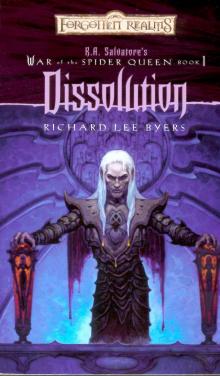 Dissolution
Dissolution Arkham Horror- Ire of the Void
Arkham Horror- Ire of the Void The Haunted Lands: Book II - Undead
The Haunted Lands: Book II - Undead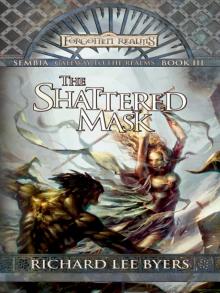 The Shattered Mask
The Shattered Mask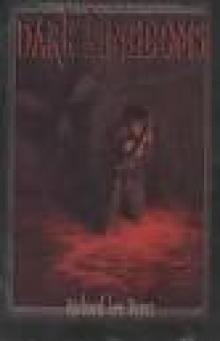 Dark Kingdoms
Dark Kingdoms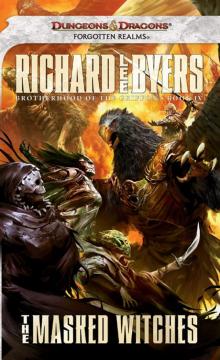 The Masked Witches: Brotherhood of the Griffon, Book IV
The Masked Witches: Brotherhood of the Griffon, Book IV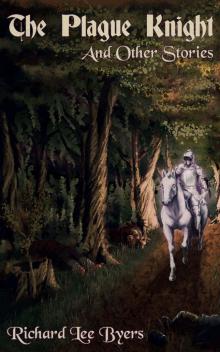 The Plague Knight and Other Stories
The Plague Knight and Other Stories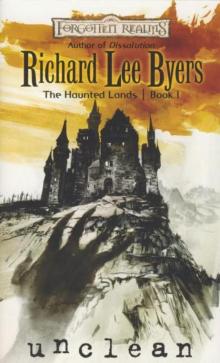 Unclean: The Haunted Lands
Unclean: The Haunted Lands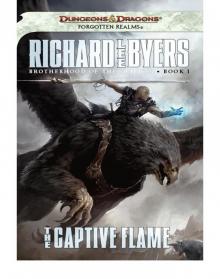 The Captive Flame: Brotherhood of the Griffon • Book 1
The Captive Flame: Brotherhood of the Griffon • Book 1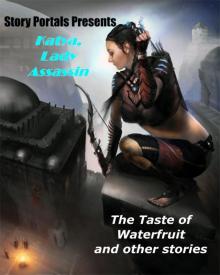 The Taste of Waterfruit and Other Stories (Story Portals)
The Taste of Waterfruit and Other Stories (Story Portals)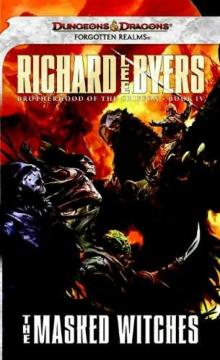 The masked witches botg-4
The masked witches botg-4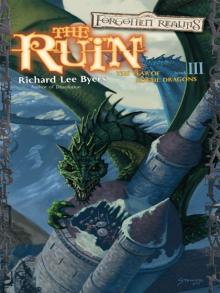 The Ruin
The Ruin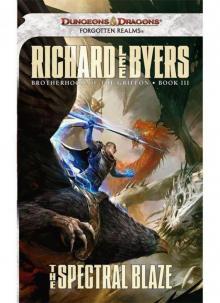 The Spectral Blaze botg-3
The Spectral Blaze botg-3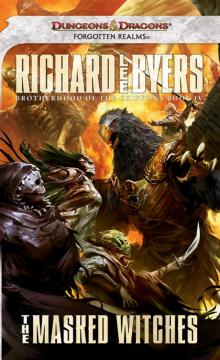 The Masked Witches
The Masked Witches Blind God's bluff bf-1
Blind God's bluff bf-1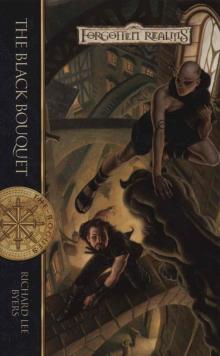 The Black Bouquet r-2
The Black Bouquet r-2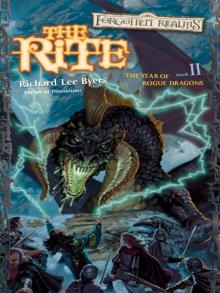 The Rite
The Rite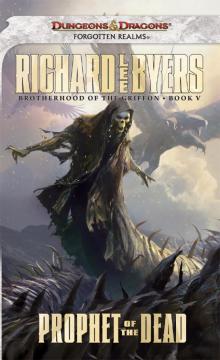 Prophet of the Dead: Forgotten Realms
Prophet of the Dead: Forgotten Realms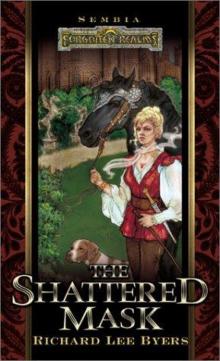 The Shattered Mask s-3
The Shattered Mask s-3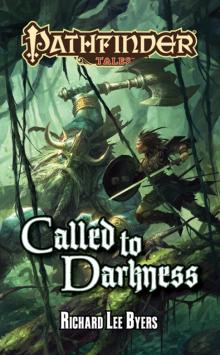 Called to Darkness
Called to Darkness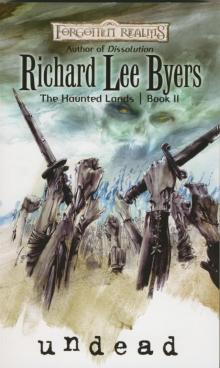 Undead hl-2
Undead hl-2 Blind God's Bluff: A Billy Fox Novel
Blind God's Bluff: A Billy Fox Novel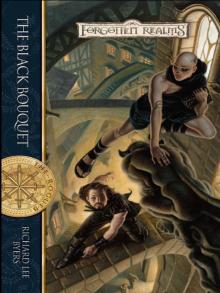 The Black Bouquet
The Black Bouquet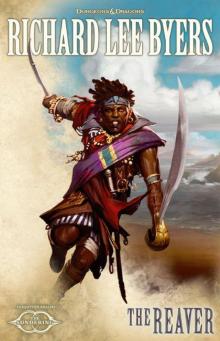 The Reaver
The Reaver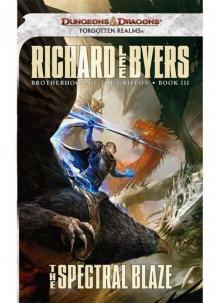 The Spectral Blaze: A Forgotten Realms Novel
The Spectral Blaze: A Forgotten Realms Novel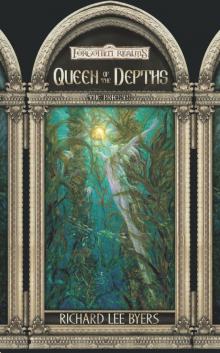 Queen of the Depths
Queen of the Depths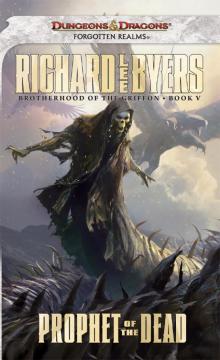 Prophet of the Dead botg-5
Prophet of the Dead botg-5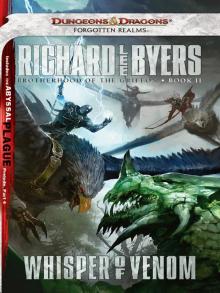 Whisper of Venom: Brotherhood of the Griffon, Book II
Whisper of Venom: Brotherhood of the Griffon, Book II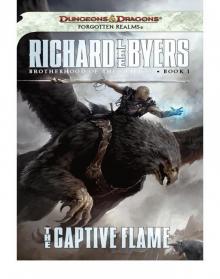 The Captive Flame botg-1
The Captive Flame botg-1 The Haunted Lands: Book III - Unholy
The Haunted Lands: Book III - Unholy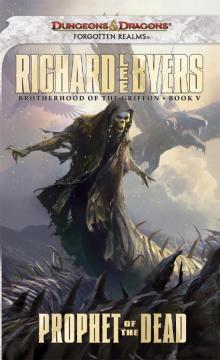 Prophet of the Dead
Prophet of the Dead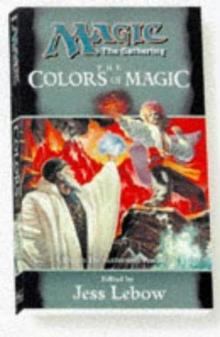 The Colors of Magic Anthology (magic: the gathering)
The Colors of Magic Anthology (magic: the gathering)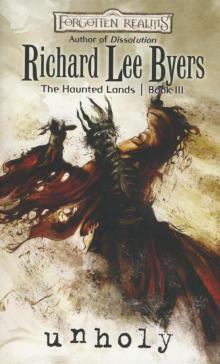 Unholy hl-3
Unholy hl-3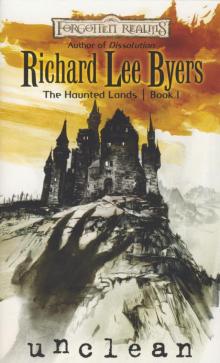 Unclean hl-1
Unclean hl-1 Blind God's Bluff
Blind God's Bluff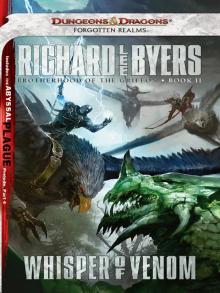 Whisper of Venom botg-2
Whisper of Venom botg-2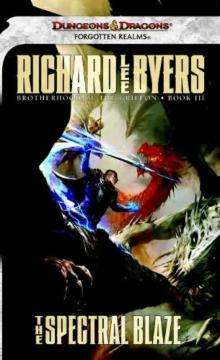 The Spectral Blaze
The Spectral Blaze